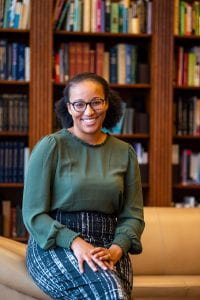Focused on improving literacy skills, the SMU Enigma literacy game is a mobile application that helps learners improve their reading skills when played an average of 60 minutes per week over eight weeks. The customized version of the game was developed by SMU researcher, Dr. Anthony Cuevas, with player options for middle and elementary school students. It was piloted at the Dr. Elba and Domingo Garcia West Dallas STEM School and was initially piloted with middle school students in an afterschool program during Fall 2023. The Enigma research resulted with positive feedback from students and increases in some literacy measures.
At the request of the school, the Enigma project was extended to Spring 2024 to pilot the game with elementary students in first and second grade. The request came from some of the elementary teachers involved in the middle school pilot who believed the game could help elementary students build their foundational literacy skills. Students play Enigma for 30-45 minutes twice per week after school as part of a structured afterschool program. They play the game as an adventurer traveling around the world experiencing new cultures and history while uncovering the secrets of the lost city of Atlantis.
Players begin by discovering a tablet in their attic with clues of a great mystery and travel to the country of Egypt. They move through five levels of gameplay by completing literacy games focusing on different foundational reading skills including: letter-sound fluency; word identification fluency; and phonological decoding fluency using onset-rime. To support Spanish-speaking multilingual learners, a read-aloud dictionary is available. The skills and content in each level are reinforced through games that mimic real world tasks, such as reading documents, labels, street signs, or lists of objects. Students find artifacts and relics to decode the ancient language of Atlantis into English.
According to Cuevas, “The game maintains interest over time because it includes an interactive and engaging story that is fun and includes activities that are grounded in learning science and evidence-based literacy instruction. They are able to improve their reading skills which provides a sense of accomplishment.”
Cuevas’ research is supported by the U.S. Department of Education. SMU continues to develop the Enigma game with financial support from the Dollar General Literacy Foundation and Barbara Bush Foundation. Dr. Diane Gifford and Dr. Corey Brady are Co-Investigators on the research project.


